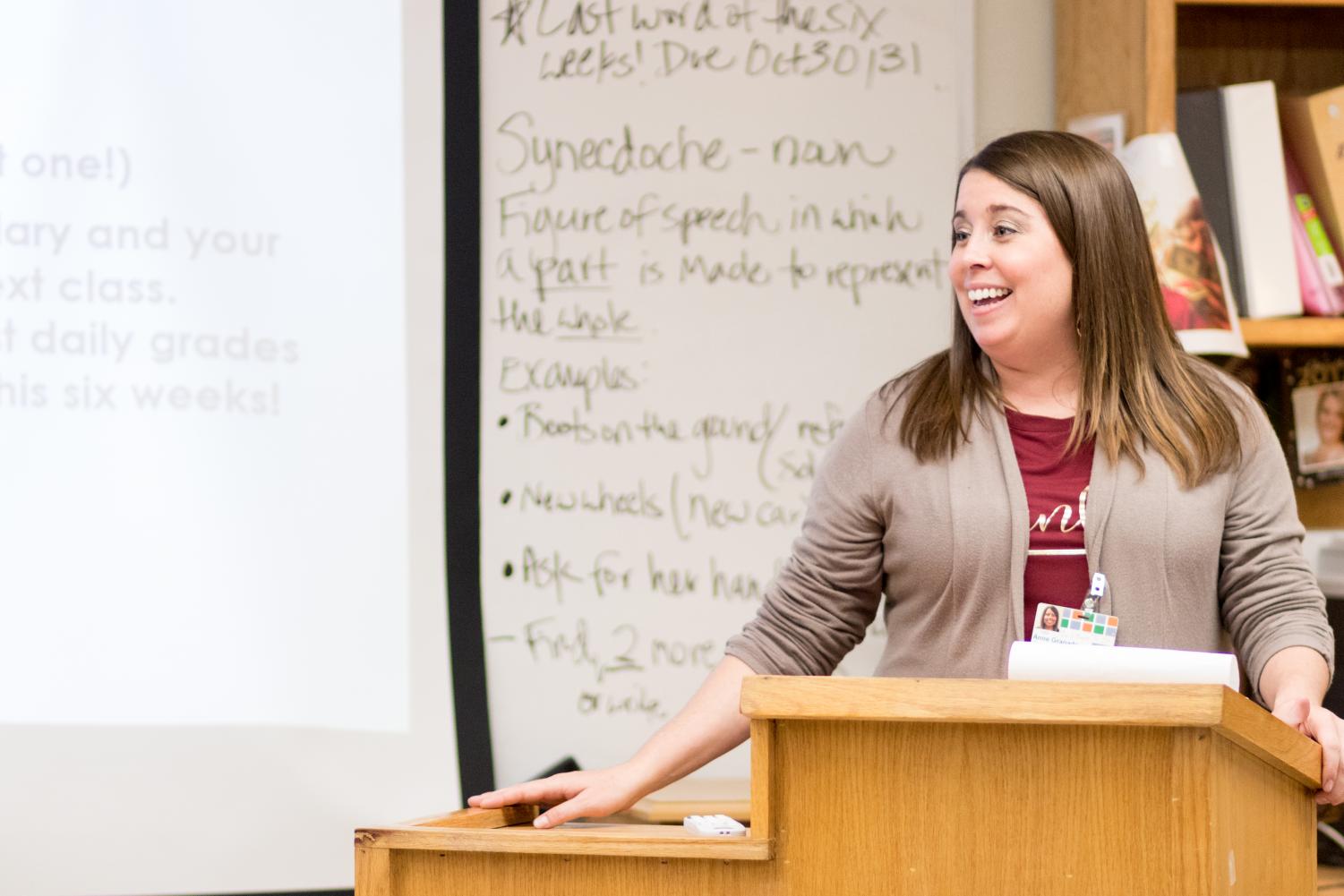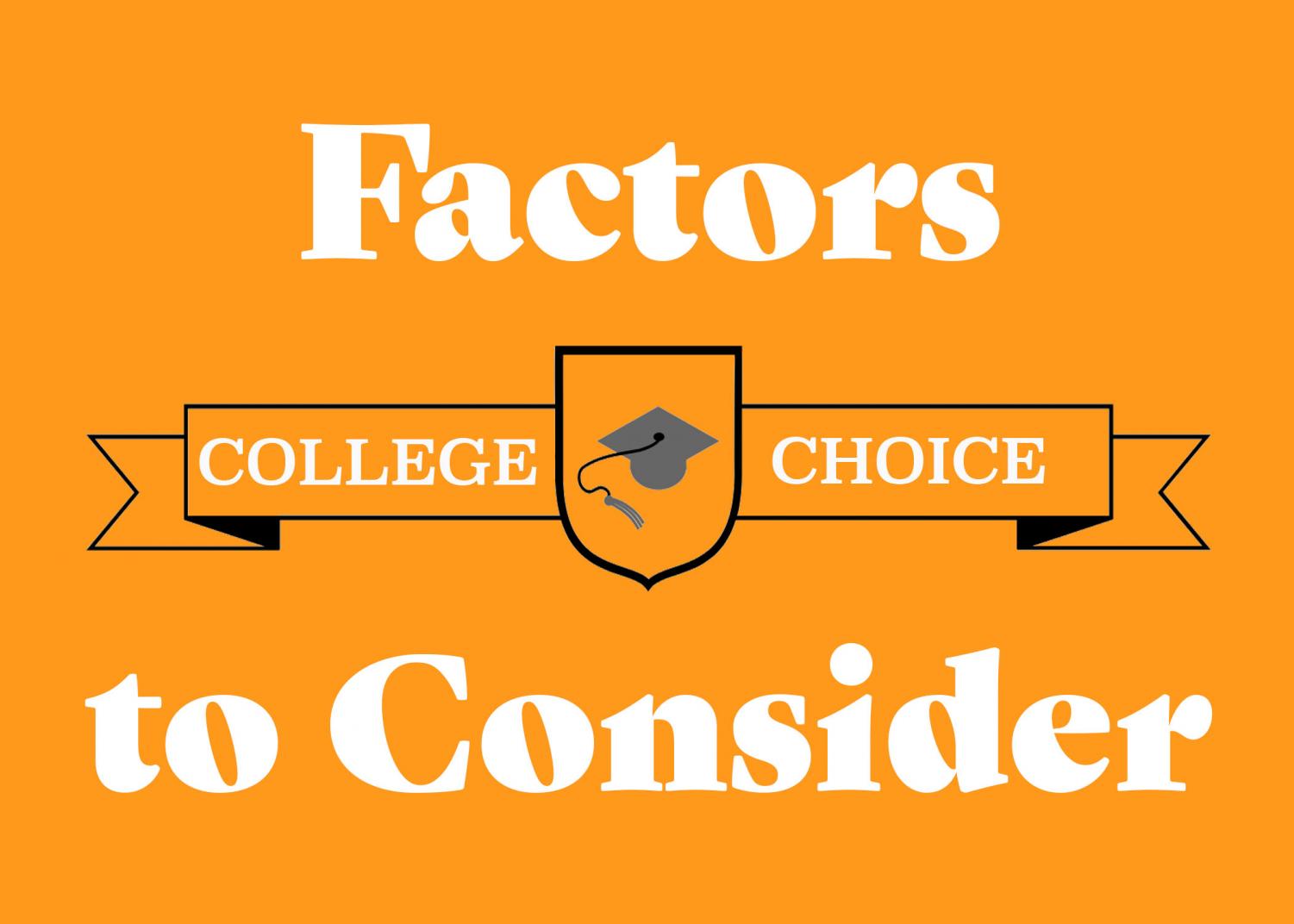The college choice
October 24, 2018
High school and college are the most formative part in someone’s life. College carries prestige and honor, rigor, challenge and opportunity— all of which combines to provide students with the best backbone for a rewarding life. The bridge between these two institutions can be a harrowing jump, but more students are going to college than ever before.
This series will navigate the various complexities of the college choice— the application process, the tough decisions, the future prospects— so that you can put your best foot forward after high school.

The application process
Preparation pays off in college acceptance
A student’s senior year is marked by many things: their last watermelon supper, new classes, the start of a final football season, and for most incoming seniors, the commencement of the college application process. While this may seem complicated and blatantly daunting, understanding the basis of this pursuit can ease the tension of an otherwise stressful time.
The college planning experience realistically begins during a student’s junior year of high school. During this period, a student is supposed to start thinking on their collegiate path.
“We have lots of tools available for our students here at Texas High School. We actually start the process the junior year, and students can get [a preparation book],” Associate Principal for College and Career Readiness Bettie Lynn Stark said. “We call it preparing for your senior year, and we just gave it to our juniors.”
Before applying to schools, there are several factors students should consider. These range from financial capability to distance from home and so forth.
“Students are looking at a lot of different things when they’re deciding where to go to college. You’re looking for location, financial costs, academic majors,” Stark said. “You’re looking for, you know, what programs and studies they offer, size, and affiliation, and you’re looking at, you know, sports, activities and extracurricular activities.”
Once a student has an idea of schools they are interested in, they can begin the actual application process. The number of schools applied to will differ with every student.
“I always recommend students to apply to four or more [colleges],” Stark said. “I think if you do the four or more and you select one safety school, a reach school, a dream school and then some kind of in the middle.”
A safety school may also be seen as a back up plan in case a student is not able to attend a college of higher preference. The even ratio between the different categories gives students a higher chance of acceptance to a school they want to go to.
“A safety school is a school where a student has there ACT and SAT scores and know they are within the range of acceptance. It is based on academics, but it can also be a safety school based on the financial [side of things],” Stark said. “A reach school is something where maybe you have a 28 on the ACT but their acceptance range is somewhere between 28 and 32. A reach school could be a dream school like if you always wanted to go to Harvard or Stanford, and your scores pretty close, go ahead and apply to see if it lines up.”
Most universities’ applications are free to submit. However, many require a fee to be paid in order to apply.
“It really depends on your school, so the more highly competitive the school is, chances are, you’re going to have an application fee that you’re going to have to pay,” Stark said. “Students who qualify for free or reduced lunch and then take the ACT using a freeway for can also get four fee waivers for college applications, four for ACT, four for SAT. Students should not let that be a burden for them in applying.” For instance, a school’s general application deadline may not coincide with the deadlines for specific programs or scholarships that it may endorse. — Anna Grace Jones
There are different applications that are widely accepted by schools across the state and the country. The Common Application is nationwide because the same application can be submitted to several schools. The Coalition Application and Apply Texas applications are generally accepted by public schools in Texas.
“My advice to students is when you’re trying to figure out which application to complete go to the website of the college you’re wanting to attend,” Stark said. “Go where they direct you to go and to which application [they accept].”
The deadlines for applying to different colleges vary based on the school and any special circumstances regarding your application. For instance, a school’s general application deadline may not coincide with the deadlines for specific programs or scholarships that it may endorse.
“For a lot of the highly competitive schools, I would say get applied by October 1-15, get your applications in,” Stark said. “You can [normally] take another ACT or a SAT, submit that in, and add to your folder if you don’t have the score you are looking for now.”
The college application process is one that requires attention and consideration. However, if time is devoted to work towards its completion, students can return to enjoying the beginning of their year and the end of their high school career.
“Take it one day at a time, come by, and use your resources. Come to the College and Career Readiness Center, and we’ll help you,” Stark said. “We’ll get started on them one at a time. The application process is not as difficult as they think, and there are people here to support them along the way.”

Making the write decision
Teacher gives input into college essays
Every year, hundreds of thousands of students must task themselves with the challenges of life after high school, whether they have aspirations of college or jumping headfirst into the workforce. But when you make the college choice, you are tasked to fill out an application. Perhaps the most important part, the essay is the student’s best opportunity to justify, humanize or redeem themselves.
Advanced Placement English 4 teacher Anne Granado deals with college essays every year around fall because she believes it’s important enough for students to work in class on their essays. Granado gives her input into writing a good college essay.
Q: How important are your college essays to the whole admission process (against resumé, awards, academics, recommendations, etc.)? What does an essay offer that the other stuff does not?
A: ¨The college essay is very important to the admission process. It is one way to humanize yourself for your admissions committee. They see your transcript, your volunteer hours and your qualifications, but they do not know you. Luckily, they want to. They don’t just want students who have the best GPA or the most leadership positions — though, these are important — they want diversity on their campus. They want people with different strengths and backgrounds. The essay will help show them who you are and what you will bring to their school.¨
Q: What do admission officers look for in a college essay?
A: ¨College Board says that admissions offices are looking for several qualities in college essays. They want to see your personality. They want you to highlight qualities that make you unique. They want to see your creativity. They also want to know that you can write on a college level.”
Q: What makes an excellent college essay stand out against other college essays?
A: ¨The best college essays have a unique focus and an image, idea, motif or symbol that unites it from beginning to end. These essays draw you in and astound you with their vulnerability, mature outlook and creativity. I have chills when I read a really good college essay because it all just comes together. You can tell when a student pushed themselves to think outside of the box.¨
Q: What do students do that seriously damage their college essays?
A: ¨Most essays that fall flat read more like a resume. Students fall into the trap of just answering the question and thinking they need to repeat information that is already on their transcript. However, the best college essays tell a story that answers the question. They present a picture of the student’s life in a way that is hard to forget. They take time, and they fill in gaps in the student’s life that an admissions officer would never get from reading their application. This is a great time to tell a story that explains why you dropped out of athletics, why you are in journalism, why your grades dropped your junior year, or why going to college is so important to you. Every student has a story. The challenge is to figure out what that unique story is and present it in such a creative, engaging way that they instantly want to know more about you.¨
Q: What tips do you have for students writing their college essays?
- Spend time brainstorming. Ask your family and friends what qualities you should highlight. Sometimes we are shy when it comes to writing about ourselves, but you want to spend time thinking about a creative story that really shows important aspects about your life and personality.
- Focus on one idea, motif, image, symbol or phrase to unite your essay.
- Tell a story that answers the question.
- Do not get attached to your first draft. Give yourself time to push yourself, be creative and make edits.
- Work with a teacher or adult or friend who will read your drafts and give you feedback.
- Proofread anything you turn in with a fine-tooth comb.
- Don’t be afraid to be yourself. You are the only you.¨
Q: Do you have any tips for writing short answers?
A: ¨When writing short answers, you really cannot tell a whole story, but remember, you still want to take time to think of those important qualities of yourself and how you can share them in a unique way. You want to engage your reader as much as you can.¨
Q: Are there any resources online to help with college essays that you recommend?
A: ¨I always show my students the College Board College Essay website. It has videos from college admissions offices, tips and sample essays. I want them to know that the tips I’m conveying to them are, indeed, what colleges are looking to see.¨

Junior Molly Kyles looks over the financial aid website. The FAFSA opened up on Oct. 1.
Financial Aid: What you should know
Aiding students for a better future
Financial student aid opened on Oct. 1 for the 2018-2019 academic year. This is a free application that can determine how much financial aid upcoming undergraduates, current undergraduates and graduates can receive. Students who are military veterans or who are currently serving in the military are also eligible to receive financial aid. Students can apply for FAFSA online through fafsa.ed.gov, through the myStudentAid mobile app, which is available on Google Play and Apple Store, or through mail by calling 1-800-433-3243.
“All students planning to attend college in the fall of 2019 are eligible to complete the FAFSA starting October 1 of this year,” said Bettie Stark, assistant principal for career and college readiness. “The purpose of the FAFSA is to see if the students are eligible for any financial aid through the federal government, which would be in the form of grants and and Pell Grants specifically.”
In order to be eligible for aid, students must meet specific criteria:
— Must be a U.S. citizen or an eligible noncitizen.
— Must have a valid Social Security number.
— Must have a high school diploma or GED certificate.
There are various documents that are required to complete the application process. Some of those proofs of documentation include a valid Social Security number from the student and/or parent if dependent, a driver’s license number if applicable and a federal tax reform, which can be IRS W-2 or a foreign tax return. If a student receives benefits or child support, information regarding this needs to be provided as well. Information on cash will also need to be provided.
If assistance is needed, one could select the tool tip, which is a white and blue question mark next to a question for more information on how to respond to it, contacting FAFSA themselves by emailing or calling, or asking a school counselor for help with providing on-hand parental information.
Before applying, it’s essential that students know the types of grants, scholarships, loans and work-study funds that FAFSA has to offer. Grants and scholarships typically do not have to be repaid, while loans are borrowed and eventually have to be paid back. Work-study funds are designated to aid students through work, which will ultimately pay off their education. In most cases, grants are need-based while scholarships are merit-based and require applications.
By browsing the FAFSA grant form below, students can see information on the different types of grants that are offered by federal aid.
https://studentaid.ed.gov/sa/sites/default/files/federal-grant-programs.pdf
FAFSA can also qualify students for jobs provided by schools based on their financial income and the school’s funding. Jobs can be on and off campus and can be paid directly through the student’s bank account or directly to the school.
“Get it done sooner rather than later. There’s a lot of money that colleges have to give out in December, January, February, rather than waiting till sometimes April or May,” Stark said.

Graphic by Molly Kyles
How to pick the perfect college
Pros, cons and everything in between
Chaotic and stressful, the choice of which college to attend is a daunting one. But when picking the place to spend the next chapter of life, fear should not be the primary emotion. Sit back, relax, make a couple of pros and cons lists, and get excited about the future.
Maybe someone does not have a definitive top three colleges. Maybe they do not have any idea of where they want to go. Maybe they were raised by wolves in the jungle and did not know what college was until today. No matter the case — the first step is research. There are endless criteria that can be used to narrow down colleges, and how much these criteria matter will vary for each individual. The important thing is to make sure to base the choice on one’s own interests and no one else’s.
Budget:
Apply for as many scholarships as possible, but do not automatically expect to get them. A $60,000 degree from an Ivy League school might not be worth it to some. They might decide to opt for in-state tuition or a killer scholarship rather than the cost of student loans. Maybe, for one’s dream career, a degree from a prestigious university is worth it. It is all about knowing what one is willing to pay and what one is able to pay. The US Department of Education’s net price calculator consolidates the financial information from hundreds of colleges into one simple, easy-to-search site. Factoring in a budget when choosing a college is a crucial step in making sure one gets the best bang for their buck.
Majors:
If someone is lucky enough to know what they want to major in, they should use that to their advantage, such as finding the schools that will give them the best advantage in their chosen field of study. Some schools offer internships in their areas of specialty to give students a hands-on experience in their desired profession. For those that have not decided on a major, picking a vague category of interest and finding schools which cater to that particular interest can be helpful. This process can be challenging. One might have their heart set on a liberal arts school, but know at the same time that they want to become a doctor. This does not mean they need to abandon the possibility of attending this school completely, but their future should be kept in mind.
Student Life:
This simple phrase is a lot more important than it seems. Student life, as it hints, consists of student life, which includes class size, faculty to student ratio, dorm rooms, campus organizations, meal plans, greek life, and much more. An important factor in making the college choice is to consider the type of school environment that is most ideal and compare that to one’s top choices. Reaching out to alumni and current students and asking about their experiences also helps to get a more personal feel for the campus.
Acceptance Requirements:
Acronyms are the dictators of this category. From ACT to SAT, FAFSA to GPA, scores and qualifications can be a big factor in college choice. One should know their strengths and weaknesses and what kind of competition they can handle. Pick a school that feels comfortable but still challenging.
Setting:
One must consider several things about themselves: do they get homesick? Do they prefer big cities or small towns? What type of place would they love to live in? All of these questions are crucial to know what type of college setting would be most enjoyable. This place will become home, so it is important to make sure it feels like it. If one’s plan is to go far away for college, make sure to visit and tour ahead of time, so one knows what to expect.
Ultimately, choosing a college is an amalgamation of a thousand little things, and which factors matter most varies from person to person. Using resources can be a great advantage. Texas High students have access to a Naviance account — which students can log into with their school email. This website features many college choice resources, including College Smart Search, which allows one to enter criteria and narrow down which schools could match them best. Talk to trusted adults and academic advisers. Do not stress out too much. If a student picks a college that they are excited about, the next chapter of their lives could be the best yet.

Graphic by Joseph Rodgers
A major question
Tips on deciding on a college major
There it is. The dreaded blank. You click on the dropdown menu and select from hundreds of options. You gaze at the screen and log off due to your uncertainty.
This is the fear for so many graduating seniors looking to further their education in college and decide on a major. They question if they should consider prestige and employment opportunity, or base the choice on enjoyment. This is a common occurrence for these young adults, just like it was for me.
After looking at all of my interests and seeing where they intersected with what jobs are in high demand by companies and employers, I determined that a healthy balance of both leads to a prosperous and enjoyable career. Although I still do not know exactly what I will do, I am much closer than I was. If you still have no idea what you want to major in, that is fine. 30 percent of college students switch majors at least once during their college years. Despite the fact I have not gone off to college and been thrown into the mix of determining my own career plan, here are the steps that I would recommend.
- Always think a step ahead. Following this step has placed me in many advantageous situations. In the summer before my freshman year, I planned out every class I would take through my senior year. There were a lot of changes and deviations from my original plan, but I had a rough idea of what I would do. Find a standard list of college majors and mark out the ones that you absolutely hate or could never see yourself doing. If you are about to enter high school, find a course guide and plan out what classes you are required to take, want to take and even courses that remotely look interesting. Talk to an academic advisor about your plan, and this will let them know that you are a motivated student causing them to be more apt to listen to you. If you are about to graduate and plan to further your education, look up classes and majors at colleges you are interested in or applying to. It is important to look at both because majors may contain courses that you do not know about but may interest you. Talk to an academic advisor about your plan just like in high school, and build and maintain a good relationship with them. Research endeavors and extracurricular activities are other important aspects to examine.
- Discover your passion, but keep an open mind. At the beginning of my freshman year, I took an engineering class, and I despised it. I was invited to apply to a NASA program during my junior year that focused on the STEM field, and knowing my admiration for NASA and my love for science fiction and space, I applied and was accepted. The online and onsite program at Johnson Space Center completely changed my mind about engineering and what it holds. Look at what classes and extracurriculars you have participated in high school. What did you truly enjoy? What did you tolerate? What were you really good at? If any of these intersected, write it down or remember that a particular major caught your attention when you answered these questions. Although the saying, “if you do what you love, you will never work a day in your life” may ring true you still need a job that will support you and possibly others.
- Find what jobs are in high demand by employers on the market. The U.S. Bureau of Labor Statistics publishes median salaries, unemployment rates and more data every year and make projections for the future for various jobs. This is a good source to use to evaluate if a college major will have good job prospects or not. See what jobs have salaries that you like and good future prospects, and make a note of those careers.
- Find the intersection between the jobs with good salaries and job prospects and the college majors that you like. Both passion and realism need to have an influence on what you decide to learn about and work on in college and the rest of your life. Your academic advisor will be knowledgeable of the campus’s various programs, and they will be able to help you join the program, major or degree that is right for you.
- At the end of the day, it is ok to be undecided about your college major. Nearly every college has a core curriculum referred to as “basics” that most freshmen and even sophomores take in college. This gives college students time to explore possible interests and maybe even reveal a hidden passion of theirs. Think of being undecided as an opportunity to explore rather than the end of the world.
These steps will allow you to rest assured that you have a plan even if that changes. Your academic advisor will help you make changes when necessary and maintain the pace of graduating in four years. Changing your major is not the end of the world, but rather, it represents the beginning of you learning about the opportunities around you.

